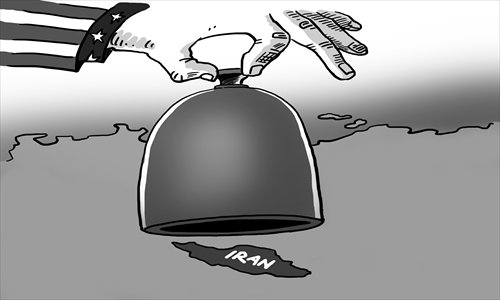Western sanctions on Iran create double-edged psychological war

The effect of the decades-long sanctions can be easily seen in Tehran, the capital of Iran: worn-out infrastructure, rising price of daily commodities, a lack of medicine for the needy. Psychology professors are even concerned about more families falling apart due to unstable social conditions in this Islamic country.
The public's anger about the deteriorating economy is obvious. In just three days in the first week of October, the Iranian rial lost more than 30 percent of its value on black market, prompting a small-scale protest of businesspeople in Tehran against the chaotic currency exchange system.
The protest was a new thing, even though people have been tolerant of inflation for a long time.
The West is trying hard to pinch Iran's nuclear ambition through tighter sanction. Financial isolation has been draining foreign currency out of the country. Cross-border money transfer, from wiring living stipends to students studying abroad to getting oil dollars back to the country, have been crippled.
Further oil embargoes are choking Iran's economic lifeline. The embargo has caused daily losses of tens of millions of dollars.
But will the sanctions eventually turn the Iranians against their government, or the contrary, will it make them more antagonistic toward the West?
On the surface, the embrace of the Western life style in Iran is easy to notice. People sip Coca-Cola in restaurants. Apple products are openly sold and avidly pursued. Young people wearing Nike shoes pass walls painted with anti-US slogans.
But that inclination, in addition to dissatisfaction toward local politicians, may not translate into anti-government sentiment strong enough to stage an Arab Spring style revolution.
As the public has borne the brunt of the sanctions, the idea that the sanctions will press people to turn against the government may have gone awry.
"They may disagree with the government. But they don't want to help the US to fight their government," said Mojtaba Borhani, 25, a Tehran resident, "Iranian people won't start a revolution to overthrow this regime, because they don't have an alternative."
Meanwhile, it is difficult for the US to foster a strong opposition force since the current choices available are all too weak, commented a veteran Chinese businessman based in Tehran.
Backed by rich oil resources, the government has managed to maintain control of the country. While many try to escape uncertainty by immigrating to Europe and North America, the devotion to late Iranian leader Ayatollah Khomeini is also clear. Every day a swarm of followers, many bringing their kids along, go to his tomb to pay tribute.
At a press conference in early October, Iranian President Mahmoud Ahmadinejad accused the West of resorting to a "psychological war" to put pressure on Iran's economic and financial sectors. Actually both sides are walking the delicate psychological line when it comes to the Iranian public.
A stressed Iranian government, dragged by an inert economy, is trying to shore up grass-roots support by pursuing the idea of equal rights of nuclear ability and using the public's resentment toward sanctions.
The West is also in a paradox where it is striving to maintain pressure on Iran but not in a way that shifts the Islamic Republic to be more conservative. Needless to say, many interest groups on both sides are raking in profits from the tension.
The nuclear talk between Iran and the West continues to be locked in a stalemate, leaving the Iranian public languishing in persistent sanctions. The odds of the powder keg exploding are increasing day by day.
Behind the impasse is a country struggling to find a path between secularity and religion, between tradition and modernization, and to win some independence from the great powers that have competed over it for centuries.
But with its strategic location and huge energy reserve, this kind of independence is bound, as other nations have found, to come at a heavy price.
The author is deputy managing editor with the Global Times. lujingxian@globaltimes.com.cn
